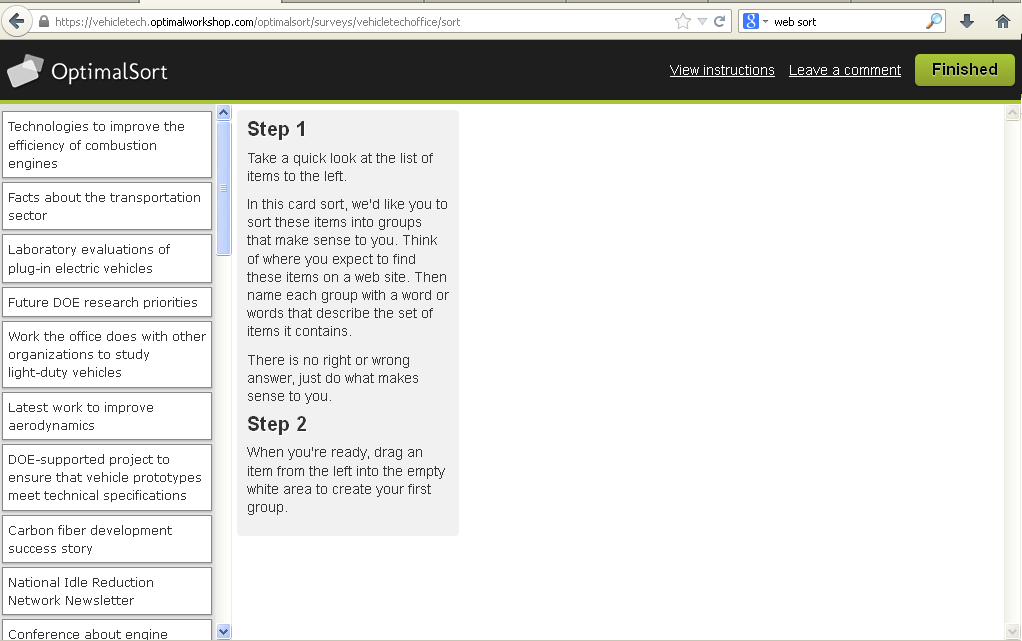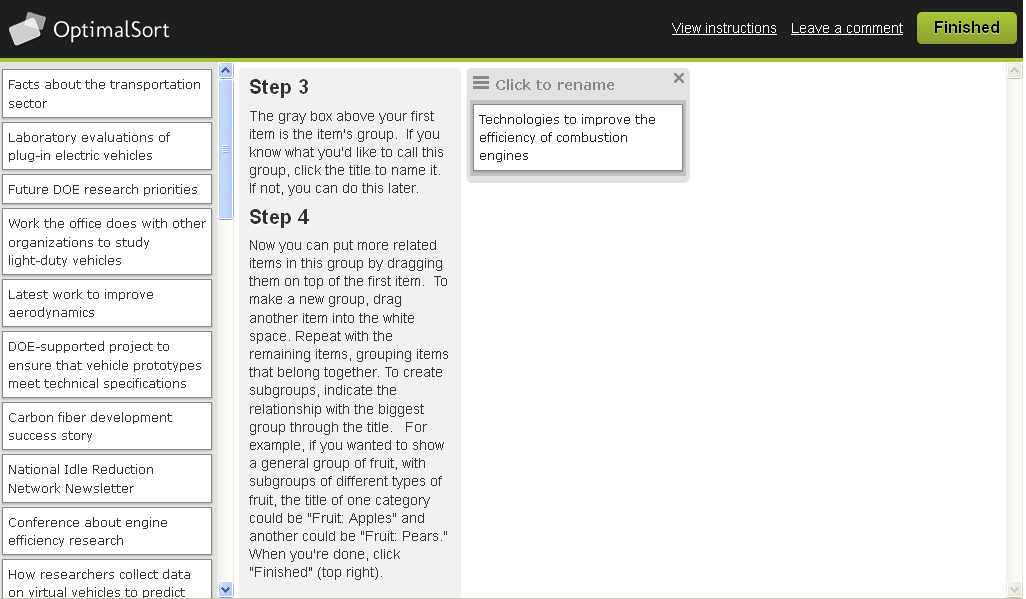Vehicle Technologies Office Online Usability Activity
Generic Clearance for the Collection of Qualitative Feedback on Agency Service Delivery
Vehicle Technologies Card Sort description FINAL 5-8-13
Vehicle Technologies Office Online Usability Activity
OMB: 1910-5160
Vehicle Technologies Office Card Sort
Card sorting is a common usability activity that helps web managers understand how users organize and label a site's content. This technique can also help identify content that is difficult to categorize or terminology that could be misunderstood on a site. The Vehicle Technologies Office would like to conduct a card sort to help us develop a new structure and labels (information architecture) for our website (vehicles.energy.gov).
In a card sort, participants organize topics from a website into categories that make sense to them. They also help name or label these categories. Please see Usability.gov for more information about card sorts (http://www.usability.gov/methods/design_site/cardsort.html) or watch this video showing a real card sort (http://www1.eere.energy.gov/communicationstandards/media/howto_websort.wmv).
The following pages describe the language and set-up that will be used in the Vehicle Technologies Office card sort. In addition to the card sort, we will also have one question before and one question after to improve our understanding of our users’ needs. You can try out a pilot of the card sort here:
https://vehicletech.optimalworkshop.com/optimalsort/vehicletechoffice-1
Unlike the real card sort, the pilot only includes 30 items instead of the full 54. Until the card sort is approved, we are using a free version of the Optimal Sort software for illustration purposes that only allows for 30 items. Once the card sort is approved, we will purchase the software and load the full 54 item list into it.
Page 1 of the card sort:
Welcome
Welcome to the Vehicle Technologies Office card sort. This activity will assist efforts to organize the content provided on the Department of Energy’s Vehicle Technologies Office’s website. This activity takes approximately 20 minutes to complete. Your participation is of great value and very much appreciated.
Page 2:
Before we begin
Before starting the card sort, please answer the following question:
What best describes the main reason you typically visit the Vehicle Technologies Office website? *
 To
do cutting edge energy research and have an impact on the field as a
scientist, inventor, researcher or graduate student.
To
do cutting edge energy research and have an impact on the field as a
scientist, inventor, researcher or graduate student.
 Use
less gasoline or diesel, use more alternative fuels, or save money on
fuel at my organization or company as an operations supervisor, fleet
manager, or business owner.
Use
less gasoline or diesel, use more alternative fuels, or save money on
fuel at my organization or company as an operations supervisor, fleet
manager, or business owner.
 Invest
in the emerging technologies in alternative fuels and transportation
as an entrepreneur, business owner or executive, or investor.
Invest
in the emerging technologies in alternative fuels and transportation
as an entrepreneur, business owner or executive, or investor.
 Reduce
the amount of money I spend on fuel or drive in a more
environmentally-friendly way for my personal vehicle.
Reduce
the amount of money I spend on fuel or drive in a more
environmentally-friendly way for my personal vehicle.
 Help
my clients use less petroleum (gasoline/diesel) or use more
alternative fuels or advanced technologies in their vehicle
fleets.
Help
my clients use less petroleum (gasoline/diesel) or use more
alternative fuels or advanced technologies in their vehicle
fleets.
 Inspire
and educate others about fuel efficient vehicles and alternative
fuels as a teacher, advocate or employee at a non-profit
organization.
Inspire
and educate others about fuel efficient vehicles and alternative
fuels as a teacher, advocate or employee at a non-profit
organization.
 Other
Other
Page 3:
(The third page has a set of instructions and then allows participants to sort the cards at their own pace.)
(Instructions)
Step 1
Take a quick look at the list of items to the left. In this card sort, we'd like you to sort these items into groups that make sense to you. Think of where you expect to find these items on a web site. Then name each group with a word or words that describe the set of items it contains. There is no right or wrong answer, just do what makes sense to you.
Step 2
When you're ready, drag an item from the left into the empty white area to create your first group.
Step 3
The gray box above your first item is the item's group. If you know what you'd like to call this group, click the title to name it. If not, you can do this later.
Step 4
Now you can put more related items in this group by dragging them on top of the first item. To make a new group, drag another item into the white space. Repeat with the remaining items, grouping items that belong together. To create subgroups, indicate the relationship with the biggest group through the title. For example, if you wanted to show a general group of fruit, with subgroups of different types of fruit, the title of one category could be "Fruit: Apples" and another could be "Fruit: Pears." When you're done, click "Finished" (top right).
(These instructions will also be available during the card sort by clicking on the button “View Instructions.” See next page for screenshots of the card sort.)
Screenshot of 1st view of page 3:

Screenshot of 2nd view of page 3, after the user drags the first item into the white space:

(When finished, the user will click on “Finished.”)
Although not visible in the screenshot, this is the full list of items the user will be sorting:
Overview of DOE's Vehicle Technology research and development program |
Future DOE research priorities |
Reports describing research results on energy storage |
Presentation on "Next Generation Inverters" from an office event |
Conference about engine efficiency research |
Carbon fiber development success story |
DOE-supported project to ensure that vehicle prototypes meet technical specifications |
Workshop to judge the merit of the research DOE is currently supporting |
Facts about the transportation sector |
Award received for R&D on cathodes for batteries |
Benchmarking current vehicles for comparison to new vehicles |
Latest work to improve aerodynamics |
Research on technologies to reduce idling on vehicles |
Ideas on how to better integrate hybrid electric vehicle propulsion components |
Alternative fuel use requirements for state and utility fleets |
Contact information for DOE Vehicle Technologies staff |
Budget information for the Vehicles office |
Work the office does with other organizations to study light-duty vehicles |
Partnership that researches heavy-duty vehicles |
Cost-shared grants that are currently open for applications |
University competition where students build ultra-efficient vehicles |
National Idle Reduction Network Newsletter |
Press release on "Energy Department Investments to Develop Stronger, Lighter Materials for Greater Vehicle Fuel Economy" |
Electric Vehicles 101 video |
Software for modeling vehicles' environmental impacts |
How researchers collect data on virtual vehicles to predict vehicle and component performance |
Building and integrating components and subsystems into vehicle prototypes |
Road test data for vehicles that run on natural gas, biofuels, propane, and hydrogen |
Laboratory evaluations of plug-in electric vehicles |
Technologies to improve the efficiency of combustion engines |
Research to reduce the vehicle emissions that cause smog |
Work on new ways to convert waste heat into electricity a vehicle can use |
Advances in materials that manufacturers can use to reduce weight in vehicles |
Research on materials needed to develop advanced powertrain systems like hybrids |
DOE's goal to make electric vehicles as affordable and convenient in 10 years as today's gasoline vehicles |
Data collected from electric vehicle Recovery Act projects |
Information on how to join a program that helps companies provide electric vehicle charging stations for employees |
Webinars to help communities promote plug-in vehicles |
Training for graduate students and professionals in areas related to electric vehicles |
Advances in chemistry and interactions in lithium and beyond-lithium batteries |
Work on battery cells and modules that are less expensive and perform better than today's |
Research on power electronics and electrical machines that convert power from the battery to the wheels of a vehicle and vice versa |
Supporting the development of engines that run on natural gas |
Improving lubricant technology to increase a vehicle's fuel economy |
An interactive map to locate ethanol stations |
Tax credits for purchasing a fuel cell vehicle |
Calculator that compares cost to drive vehicles over their lifetimes |
Pros and cons of choosing a propane vehicle |
Database to look up the fuel economy of any car back to 1982 |
Tips to drive more efficiently and use less gas |
Local groups that can help volume vehicle purchasers use less oil |
How to license technologies from DOE |
Hydrogen Production Basics |
Fact sheet on how propane vehicles work |
Page 4
Having completed this activity, did you find any cards difficult to sort? If so, please identify which card and why you found it difficult.
Page 5
Thank you for your participation. Your feedback helps to determine how the content should be organized, making the website easier to use. This activity has concluded; you may now close this window.
| File Type | application/vnd.openxmlformats-officedocument.wordprocessingml.document |
| Author | Shannon Shea |
| File Modified | 0000-00-00 |
| File Created | 2021-01-30 |
© 2026 OMB.report | Privacy Policy